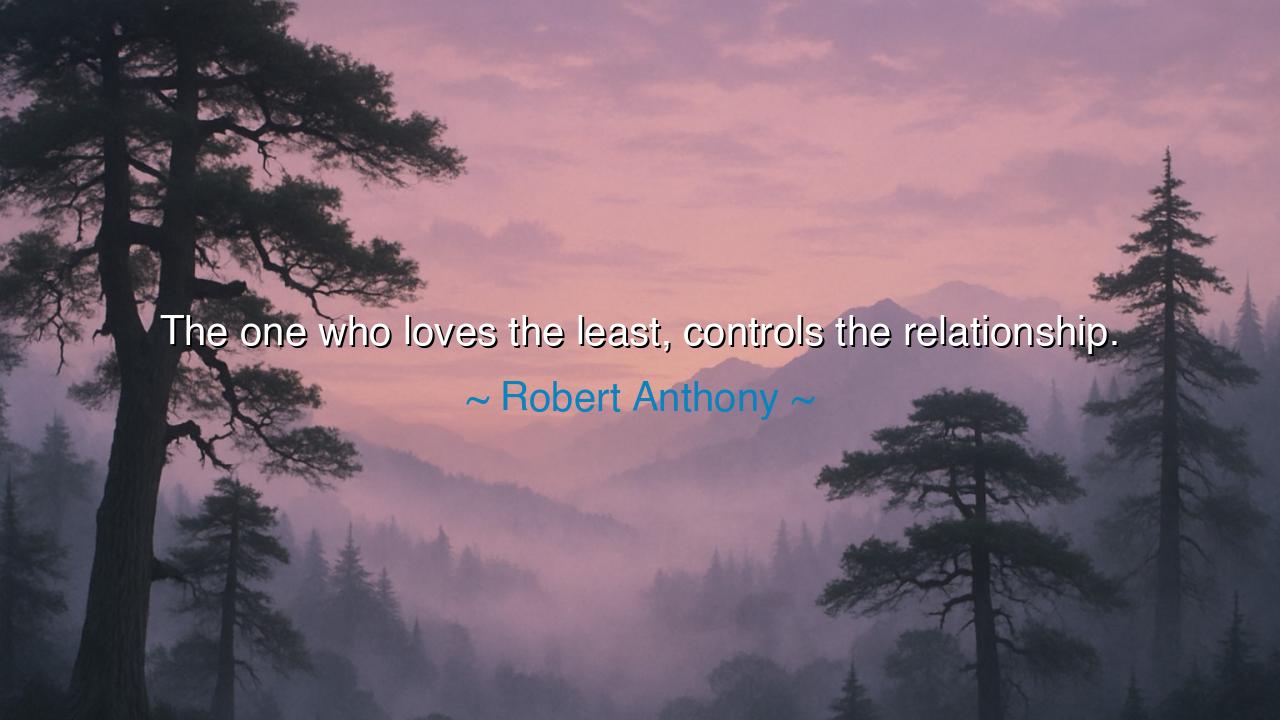
The one who loves the least, controls the relationship.






Hearken, O seekers of the heart’s mysteries, to the words of Robert Anthony, the sage of human dynamics: "The one who loves the least, controls the relationship." In this utterance lies the ancient truth that power in bonds of intimacy is often measured not by affection, but by restraint. The heart that guards itself, that withholds full surrender, holds sway over the one who gives freely, revealing the delicate balance of love, desire, and influence.
In the theater of human connection, many are drawn to love with abandon, believing devotion alone secures harmony and trust. Anthony illuminates that the heart that gives without measure may unwittingly yield authority to the one who loves sparingly, for in measured attachment lies leverage and control. True understanding of relationships demands awareness of this subtle interplay between passion and prudence, freedom and influence.
The ancients, who chronicled the lives of lovers, friends, and kin, understood that the soul that restrains can govern, and the soul that surrenders can be swayed. From tales of kings and philosophers to the poets’ lament of unbalanced devotion, the wisdom is clear: the one who tempers love with judgment wields power, while the one who loves fully yet blindly may find themselves guided by another’s hand.
Yet this teaching carries subtle depth: the knowledge of control is not a call to manipulation, but to self-awareness and balance. Anthony’s insight urges the seeker to temper both affection and attachment, to love deeply while remaining conscious of one’s own agency. In doing so, one honors both the bond and the self, cultivating a relationship that is neither domination nor surrender, but mutual respect and conscious engagement.
Therefore, O children of the heart, let this teaching lodge in your souls: in matters of love and connection, power often rests with the heart that loves least, yet wisdom lies in the harmony of self-awareness and devotion. By balancing surrender with discernment, one navigates the eternal currents of intimacy, preserving freedom, fostering trust, and embracing the timeless wisdom of the ancients on the subtle art of human bonds.






NYNhi Yen
Robert Anthony’s perspective on love and control is quite provocative. It seems to imply that emotional detachment gives someone the upper hand in a relationship, which goes against the typical idea that love should be equal and mutual. Do you think this idea is true, or do you believe that in a healthy relationship, both people should love equally and have equal influence?
TNTao Nu
The idea that the one who loves the least controls the relationship is definitely intriguing. It suggests that love might make us vulnerable, and in that vulnerability, the other person holds more power. Does that mean that loving less is a way to protect oneself from being controlled? How do you find the balance between loving deeply and not losing yourself in the process?
TVdo phuc tuong vi
I find this quote quite interesting, though it feels a little unsettling. It implies that love isn’t always about equal emotional investment, and that the one who loves less holds the upper hand. How do you feel about relationships where the emotional balance isn’t equal? Do you think control is inevitable when love is not equally shared, or is it possible to have a healthy relationship with unequal feelings?
VDVan Duong
This quote is thought-provoking because it challenges the common assumption that love equals power in a relationship. It seems to suggest that when one person loves less, they become less vulnerable and thus can dominate. Is this a healthy dynamic in relationships? Do you think love should be about equality, or is there always an element of imbalance when one person loves more than the other?
HNHieu Nguyen
Robert Anthony’s quote really made me reflect on the dynamics of love and control in relationships. It suggests that the one who cares the least has the power, which seems counterintuitive, but could be true in some cases. Do you think that in relationships, love equals vulnerability, and that being less emotionally invested allows someone to take control? Can true love exist if one person holds the power?